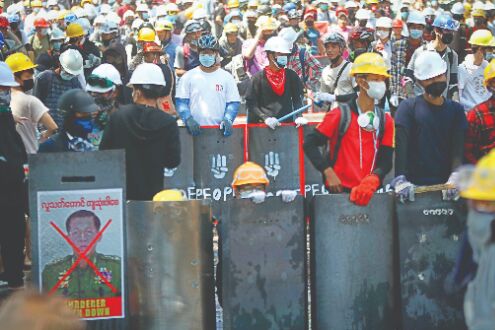Myanmar cracked down brutally on protests, may get worse

Tokyo: Myanmar's security forces have killed scores of demonstrators protesting a coup. The new junta has jailed journalists and anyone else capable of exposing the violence. It has done away with even limited legal protections. The outside world has responded so far with tough words, a smattering of sanctions and little else.
The slide from a nascent democracy to yet another coup, as rapid as it has been brutal, opens up a grim possibility: As bad as it looks in Myanmar now, if the country's long history of violent military rule is any guide, things could get worse.
Protesters have continued to fill the streets despite violence that left 38 people dead one day this week though in smaller numbers than the weeks right after the February 1 coup.
They have used smartphones to capture the brutality. Recent videos show security forces shooting a person at point-blank range and chasing down and savagely beating demonstrators.
The military, however, has the clear upper hand, with sophisticated weapons, a large network of spies, the ability to cut telecoms, and decades of fighting experience from civil conflicts in the country's borderlands.
We are at a crisis point, Bill Richardson, a former US ambassador to the United Nations with long experience working with Myanmar, told The Associated Press, pointing to the arrests of journalists, including AP's Thein Zaw, and the indiscriminate killing of protesters.
The international community needs to respond much more forcefully, or this situation will degenerate into complete anarchy and violence.
So, will it?
Governments around the world, including the United States, have condemned the coup, which reversed years of slow progress toward democracy.
Before that opening up began, Myanmar had languished under a strict military rule for five decades that led to international isolation and crippling sanctions. As the generals loosened their grip in the past decade, the international community lifted most sanctions and poured in investment.
Despite the flurry of recent global criticism, however, there's not much hope that pressure from outside will change the course of events inside the country.
For one thing, coordinated action at the UN like a global arms embargo that the world body's independent expert on human rights in Myanmar, Tom Andrews, called for is unlikely.
Russia and China, Myanmar's most powerful supporter, are still selling arms to the military and they each have a permanent seat on the UN Security Council and thus could veto any such measure. The Security Council will take up the crisis in Myanmar on Friday.
Myanmar's neighbors, the countries that make up the Association of Southeast Asian Nations, are generally loathe to interfere in one another's affairs a policy that means they are unlikely to do anything more than call for talks between the junta and the ousted government of Aung San Suu Kyi.
That leaves sanctions from the United States and other Western countries. Washington imposed sanctions on Myanmar's top military leaders after the Feb. 1 coup.
More pressure came after a U.N. envoy said security forces killed 38 people on Wednesday. Britain imposed sanctions on three generals and six members of the junta in response to the coup and the crackdown. The European Union is drawing up measures to respond to the coup.



